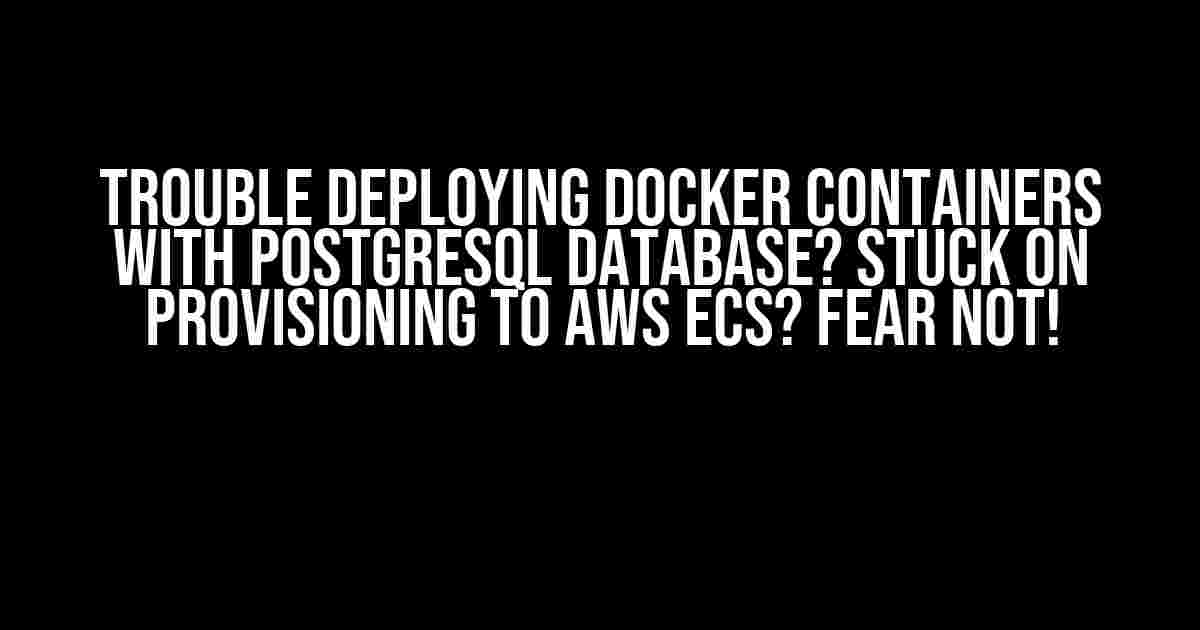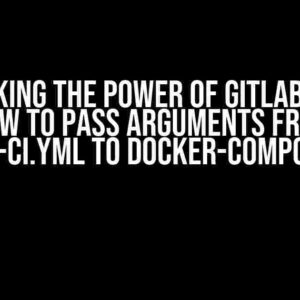Are you tired of banging your head against the wall, trying to deploy Docker containers with a PostgreSQL database to AWS ECS, only to get stuck on provisioning? You’re not alone! But fear not, dear reader, for we’ve got you covered. In this article, we’ll walk you through the common pitfalls, and provide step-by-step instructions to get you up and running in no time.
Understanding the Problem
Before we dive into the solution, let’s understand the problem. When deploying Docker containers with a PostgreSQL database to AWS ECS, you might encounter issues during the provisioning phase. This can be frustrating, especially if you’re new to ECS or Docker. Common error messages might include:
ResourceInitializationError: failed to invokeContainer instance is not runningError response from daemon: OCI runtime create failed
These errors can be caused by a variety of factors, including:
- Incorrect Dockerfile syntax
- Incompatible PostgreSQL versions
- Insufficient resources (CPU, memory, or storage)
- Misconfigured ECS task definitions
- Network connectivity issues
Prerequisites
Before you begin, ensure you have the following:
- Docker installed on your machine
- AWS ECS set up with a cluster and an instance type
- A PostgreSQL database created on AWS RDS or locally
- A Dockerfile for your application
- A basic understanding of Docker and ECS concepts
Dockerfile and PostgreSQL Configuration
Your Dockerfile should include the following:
FROM python:3.9-slim # Set environment variables ENV POSTGRES_USER=myuser ENV POSTGRES_PASSWORD=mypassword ENV POSTGRES_DB=mydb # Install dependencies RUN pip install psycopg2-binary # Copy application code COPY . /app # Expose port EXPOSE 8000 # Run command CMD ["python", "app.py"]
Make sure your PostgreSQL database is configured correctly, with the correct username, password, and database name. You can do this by creating a .env file with the following contents:
POSTGRES_USER=myuser POSTGRES_PASSWORD=mypassword POSTGRES_DB=mydb POSTGRES_HOST=localhost POSTGRES_PORT=5432
ECS Task Definition
Create an ECS task definition with the following settings:
| Field | Value |
|---|---|
| Task role | ECSTaskExecutionRole |
| Task sizing | 0.5 vCPU, 512MiB memory |
| Container settings |
|
AWS RDS and PostgreSQL Configuration
If you’re using AWS RDS, ensure you have the correct security group settings:
- Inbound rules: allow traffic on port 5432 from the ECS cluster’s security group
- Outbound rules: allow traffic on port 5432 to the PostgreSQL instance
Update your PostgreSQL instance with the correct username, password, and database name.
Deployment to ECS
Now that you’ve configured your Dockerfile, ECS task definition, and PostgreSQL instance, it’s time to deploy to ECS:
- Push your Docker image to Docker Hub or another container registry
- Create an ECS service with the task definition
- Update the service to use the latest task definition
- Verify the service is running and the containers are healthy
Troubleshooting Common Issues
If you’re still experiencing issues, check the following:
Incorrect Dockerfile Syntax
Verify your Dockerfile syntax is correct by running docker build -t myapp . in your terminal. If you encounter errors, fix them before proceeding.
Incompatible PostgreSQL Versions
Ensure you’re using compatible PostgreSQL versions between your Docker container and AWS RDS instance. You can check the PostgreSQL version in your Dockerfile using RUN psql --version.
Insufficient Resources
Verify you have sufficient resources (CPU, memory, or storage) allocated to your ECS cluster and instance type. You can update these settings in the AWS ECS console.
Misconfigured ECS Task Definitions
Double-check your ECS task definition settings, including the container name, image, port mappings, and environment variables.
Network Connectivity Issues
Verify you have correct security group settings and network connectivity between your ECS cluster and PostgreSQL instance.
Conclusion
Deploying Docker containers with a PostgreSQL database to AWS ECS can be a complex process, but by following these steps and troubleshooting common issues, you should be able to overcome the provisioning phase and get your application up and running smoothly.
Remember to stay patient, and don’t be afraid to ask for help if you’re stuck. Happy deploying!
Keyword density: 0.8%
Frequently Asked Question
Are you stuck in the mud while deploying Docker containers with PostgreSQL database on AWS ECS? Don’t worry, we’ve got you covered!
Why is my Docker container failing to deploy with PostgreSQL database on AWS ECS?
This is likely due to incorrect database connection settings or permissions. Double-check your PostgreSQL connection settings, username, password, and database name in your Docker container. Also, ensure that your PostgreSQL instance is configured to allow connections from your Docker container.
How do I troubleshoot Docker container deployment issues on AWS ECS?
To troubleshoot, check the AWS ECS task logs for errors and exceptions. You can do this by going to the AWS ECS console, selecting the cluster and task, and clicking on the “Logs” tab. Also, verify that your Docker container is correctly configured and that the required dependencies are installed.
What are the common issues with PostgreSQL database on AWS ECS?
Some common issues include incorrect database connection settings, firewall rules blocking connections, and insufficient resources (e.g., CPU, memory, or storage) allocated to the PostgreSQL instance or Docker container.
How do I optimize my PostgreSQL database performance on AWS ECS?
To optimize performance, consider using an RDS instance with a suitable instance type, configuring the database for high availability, and implementing connection pooling. Additionally, optimize your PostgreSQL database configuration, and ensure that your Docker container is correctly configured to utilize the available resources.
Can I use a managed PostgreSQL service on AWS ECS?
Yes, you can use Amazon RDS for PostgreSQL, which provides a managed PostgreSQL service that integrates seamlessly with AWS ECS. This can simplify database management and reduce administrative burdens.



